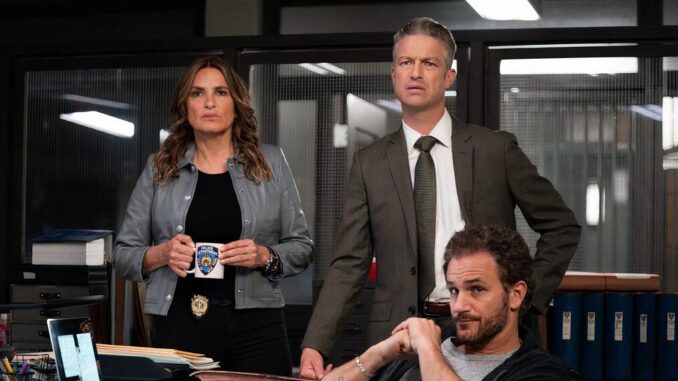
SVU Tackles Most Controversial Case Yet – Based on True Events
The familiar dun-DUN hits, a comfortingly bleak promise that justice, however elusive, will be pursued. For over two decades, Law & Order: Special Victims Unit has been America’s dark mirror, reflecting the harrowing realities of sexual violence. But sometimes, even the familiar can become a crucible, and the latest season premiere felt less like a procedural drama and more like a collective societal therapy session, brutally ripped from the headlines, titled with audacious simplicity: "The Senator's Intern."
From the opening shot, the air crackled with a tension thicker than usual. Olivia Benson, her face a mask of familiar world-weariness, stood opposite a young woman, barely out of college, whose wide, haunted eyes seemed to hold the weight of every accusation ever made. The defendant wasn't a nameless perp from the city's underbelly; she was Senator Eleanor Vance, a titan of progressive politics, a vocal champion of women's rights, and a figure whose public persona was as carefully crafted as it was universally admired. This wasn't just based on true events; it felt like a direct, unflinching gaze into the very core of the real-life maelstroms that have rocked the nation.
The brilliance, and the sheer audacity, of "The Senator's Intern" lay in its refusal to offer easy answers. The alleged assault, a blurred memory from a campaign fundraiser, unfolded in fragmented flashbacks, each one a testament to the unreliable nature of memory, trauma, and perception. Was it a consensual, if ill-advised, encounter that turned sour? Or was it a calculated act of predatory abuse hidden beneath a veneer of respectability and power? The show didn’t just present the facts; it presented the nuances, the deeply uncomfortable ambiguities that plague real-world cases when power dynamics intersect with allegations of sexual misconduct.
The controversy wasn't just contained within the fictional world of the precinct. It bled into the audience, sparking heated debates across social media, mirroring the very divisions that defined the real-life sagas it so clearly evoked. Every line of dialogue felt charged, every piece of evidence, every cross-examination, was a direct echo of actual testimony, actual public outcry. Viewers found themselves uncomfortably aligning with one side or the other, or worse, finding themselves unable to choose, caught in the moral quagmire that the episode so expertly laid bare.
Even the seasoned SVU team found themselves navigating treacherous ethical waters. Olivia, whose career had been a testament to victim advocacy, visibly wrestled with the possibility that the accuser might not be entirely truthful, or that the "victim" might, in some uncomfortable way, be complicit in her own predicament. Fin Tutuola, usually a cynical rock, found himself uncharacteristically quiet, observing the media circus that erupted around the case—a frenzy amplified by the defendant's celebrity. Carisi, the prosecutor, found his legal mind grappling with the insurmountable challenge of proving guilt or innocence when the court of public opinion had already rendered its verdict, fueled by partisan loyalties and ideological divides.
The episode dared to explore the painful paradox of the #MeToo era: the imperative to believe victims, juxtaposed with the due process rights of the accused, especially when the accused is a beloved public figure. It delved into the weaponization of allegations, the blurring lines between political smear and genuine grievance, the way truth itself becomes elastic in a polarized world. "The Senator's Intern" wasn't just controversial because of its subject matter; it was controversial because it refused to take a side, instead opting to show the messy, agonizing reality of a society grappling with its own moral compass.
As the credits rolled, there was no triumphant conviction or clean acquittal. There was only the chilling echo of ambiguity, the lingering questions that plague real-life headlines. SVU had done more than just tackle a controversial case; it had held up a mirror, unflinching and unblinking, to the raw, unresolved traumas of our collective consciousness. It reminded us that justice is not always neat, truth is rarely absolute, and sometimes, the most disturbing cases are the ones where the monster isn't a clear villain, but a reflection of the complicated, often contradictory, human condition. And in that discomfort, perhaps, lay its most profound impact.
